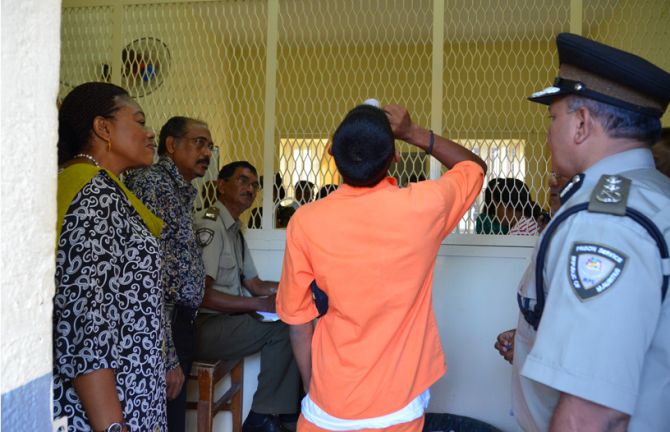

UNAIDS Executive Director Michel Sidibé visiting the opioid substitution programme at the Central Prison in Beau-Bassin, the largest prison in Mauritius, on 19 April 2014. Credit: Government of Mauritius.
Feature Story
Harm reduction among prison inmates in Mauritius
22 April 2014
22 April 2014 22 April 2014In 2006, the Government of Mauritius started harm reduction programmes—needle exchange programmes and opioid substitution therapy (methadone)—to reduce the transmission of blood-borne infections among people who inject drugs both inside and outside prison. Government figures from 2012 show that more than 5 400 people were enrolled on opioid substitution therapy, and the Global AIDS response progress report for Mauritius for 2012 shows that HIV transmission through injecting drug use in Mauritius declined from 73% in 2010 to 68% in 2011.
During an official visit to Mauritius, UNAIDS Executive Director Michel Sidibé visited the Central Prison in Beau-Bassin, Mauritius’s largest prison, to learn about its opioid substitution programme, which allows inmates to continue receiving a daily dose of methadone while imprisoned.
During the visit, Mr Sidibé commended the Government of Mauritius and nongovernment organizations for putting in place a programme that ensures the well-being of inmates. “The quality of the treatment of prisoners reflects the level of humanity in Mauritius,” said Mr Sidibé. “The Central Prison in Beau-Bassin is restoring human dignity in all its dimensions.”
Government figures show that in March 2014 an estimated 2 289 convicted and remand detainees were held in nine prisons in Mauritius. Almost 40% of male inmates in the country are imprisoned due to drug-related crimes, and 30% of inmates are living with HIV. Sharing of smuggled injecting equipment is common in jail, which increases the risk of HIV infection while in custody.
Mauritius is proud to be among the few countries to implement a methadone programme in prison, which covers more than 200 inmates,” said Jean Bruneau, Commissioner of Prisons in Mauritius. “Because of this programme, Mauritius has been able to reduce HIV transmission among prisoners who use drugs.”
“I am grateful to the government for supporting the methadone programme and other important services at the prison care centre,” one prison inmate told Mr Sidibé. “This is preparing me to get back to a normal life and be a valued member of my community.”
During his visit to Mauritius, Mr Sidibé also met with representatives of civil society organizations and networks of people living with HIV to discuss opportunities and challenges in the national AIDS response.
“My discussion with civil society was a moment of truth, an exchange that brought a face to the epidemic,” said Mr Sidibé. “As we look to our post-2015 goals, we must make sure that no one is left behind.”
Stigma and discrimination towards people living with HIV remain critical to the national AIDS response. The People Living with HIV Stigma Index shows that in Mauritius 30% of respondents—people living with or affected by HIV—had fears about being insulted or verbally threatened or harassed, while 23% feared physical assault. Additionally, 28% of respondents reported being denied access to health services due to HIV, while 40.5% reported discriminatory or very discriminatory responses to disclosures of their HIV status to health-care workers.
“People are stigmatized and discriminated because of their HIV status—they are continuously denied services, excluded from their communities and face the threat of deportation. These are the realities of people living with HIV in Mauritius,” said Nicolas Ritter, Executive Director of Prévention Information et Lutte contre le SIDA.



